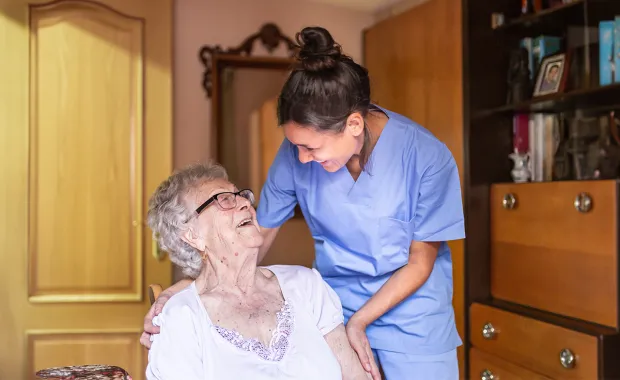Delta Wellbeing a choisi CGI comme partenaire stratégique à long terme pour améliorer les soins de santé et les services sociaux dans l’ouest du pays de Galles et dans d’autres régions. Grâce à Delta CONNECT, son nouveau programme de transformation numérique, Delta Wellbeing met en œuvre un nouveau modèle d’autoassistance et de soins proactifs pour améliorer le bien-être, aider les gens à rester autonomes et réduire les demandes de soins de santé et de recours aux prestations des services sociaux de courte ou longue durée. L’objectif initial de ce partenariat est la numérisation des services de télésoins de Delta Wellbeing, en prévision de l’arrêt de ses systèmes analogiques prévu pour 2025, ainsi que la création d’une plateforme pour la prestation de nouveaux services numériques de santé et de soins.
Aucune organisation ne possède à elle seule toutes les réponses et tous les services dont un individu a besoin. La collaboration avec des partenaires des secteurs tertiaire, commercial et des services sociaux comme CGI permet aux organisations de soins de santé d’aller au-delà de ce qu’elles pourraient réaliser seules. Par exemple, la collaboration avec une université favorise l’exploration de nouvelles technologies et idées. Un partenariat avec une entreprise qui a une connaissance approfondie des données et de la manière dont elles sont utilisées pour relever les défis d’autres marchés peut contribuer à simplifier les services de santé et de soins. Les partenariats efficaces augmentent l’étendue des services et stimulent l’innovation.
Les différentes organisations disposent de systèmes distincts et parfois multiples qui ne communiquent pas toujours entre eux. Par conséquent, le partage d’informations – souvent appelé interopérabilité – peut s’avérer difficile. Par exemple, un médecin peut seulement se reporter aux renseignements auxquels il a accès lors d’une consultation avec un patient. Les conseils de santé et les services de soins de courte durée peuvent détenir d’autres informations essentielles auxquelles le médecin n’a pas accès. Ce manque de vision globale est un défi sérieux qui doit être relevé. Une meilleure compréhension des possibilités offertes par l’intégration et l’interopérabilité est cruciale pour faire avancer le changement. De même, un mandat de leadership solide peut favoriser une mentalité plus collaborative lorsqu’il s’agit de partager des informations et de financer des projets.
Le parcours de santé et de soins doit être construit en collaboration avec différents partenaires et être centré sur le patient. L’objectif global est de favoriser la collaboration entre les patients, leurs familles, les organismes publics, privés et du secteur tertiaire. Toute personne ayant une influence ou un impact sur une personne qui bénéficie de soins de santé ou de services sociaux devrait pouvoir fournir des informations et y accéder de manière ouverte et interopérable. Encourager l’alignement culturel et une compréhension commune entre les parties concernées permet à ces dernières de travailler ensemble à la résolution des problèmes, ce qui améliore les résultats tout au long du parcours de soins du patient. Ces partenariats permettent d’obtenir de meilleurs résultats plus rapidement et sont fondés sur une bonne communication afin de prévenir le gaspillage de ressources et la répétition des efforts.
Pour plus d’information de la part de Stuart Parsons et Gareth Rees sur le partenariat entre Delta Wellbeing et CGI, écoutez l’intégralité du balado.
Il s’agit du troisième des trois balados dédiés au partenariat entre Delta Wellbeing et CGI. Pour en apprendre davantage à ce sujet, écoutez le premier et le deuxième balado de la série. Pour toute question ou remarque, communiquez avec Stuart Parsons
- 1. Introduction
-
Divya Bedi: Hello and welcome to our final and third podcast in a three-part podcast series, focusing on digital health and care, where we will not only be looking at the current challenges in the marketplace, but how digital technology and strategic partnerships can overcome these and pave the way for a new model of care, putting the patients right at the heart of services being delivered.
My name is Divya Bedi, Project Manager, CGI, and I will be your host for this series. CGI has been selected by Delta Wellbeing as its long-term strategic partner to improve health and social care in West Wales and beyond through its new digital transformation program.
The Delta CONNECT program is transforming the way that health and social care is delivered, implementing a new model of self-help and proactive care to improve wellbeing, help people stay independent and reduce demands on long-term or acute health and social care.
The initial focus of this partnership between CGI and Delta is the digitization of Delta Wellbeing's telehealth services in preparation for the upcoming analog switch-off in 2025, creating a platform for new digital healthcare and service delivery. Our first podcast covered the current challenges we are facing, and the role technology has in overcoming these, followed by the second podcast, which covered the future of health and care over the next few years. Today, we will be focusing on partnerships that can bring success in health and care.
With me today, we have Gareth Rees, Strategic Innovations Program Lead from Delta Wellbeing.
Gareth Rees: Hello.
Divya: Stuart Parsons, Director, Consulting Services for Health and Care from CGI.
Stuart Parsons: Hi.
- 2. The value of partnerships and collaborations
-
Divya: Let me start by asking the first question. Why are partnerships and collaborations so important in this industry?
Gareth: I would say that partnerships and collaborations are really important across health and social care. Firstly, because it's a huge complex system that we have within health and social care. Scale, first of all, is a really major issue. No one organization has all the answers. If you think you've got NHS, social care, third sector organizations, and companies, enterprises, no one individual organization has all the answers and all the services that an individual needs.
If we were to take Delta Wellbeing, as an example, we're a small medium enterprise, and we've got limited capacity. Working with partners such as the health board, or third sector partners, our social care partners, and CGI, and other commercial partners, enables us to do things far beyond what we would be able to do if we were just working alone. I think that's probably one of the key parts for us. We also do a lot of collaboration with organizations like universities, Swansea University, Cardiff University, and others, looking at new tech and ideas. That's where the innovation comes from in a lot of cases, as well. I'd say those are the two key things, really. One, it's around scale, and one, it's about bringing new ideas and new innovations into what we do.
Stuart: Yes, I agree with Gareth. I think a lot of what we do when we look for partners is bolt into that global expertise often, or that wider expertise, and how we can bring that to the market in which we are in. That can be some brand-new outside ideas. Also, it can be like real specialist understanding and knowledge around maybe even something unique, like the data, and how they've been tackling those data challenges in other markets and applying that then to health and care in the sector in which we're working.
I think it's a lot about being able to look out, branch out to others for support in that wider sphere of what's been done before and how we can apply it now. I think a lot of organizations, especially outside health care, are well versed in working with partners to co-create the right answer to a question, and combining knowledge and understanding to solve a problem. I think when we look outwardly, often it can be to try and just get that knowledge, that partnership working, that strategic partnership-style approach to how we can all combine thoughts and ideas to tackle the challenge that we're in. A lot of what we have now is not necessarily a unique challenge, just the health and care sector. Yes, really being able to delve into how others have tackled this before makes the partnership working just really critical, I think.
Gareth: I think following on from that as well, if you think about as an individual, whether that person's a patient or a service user in social care, they will have lots of different touch points with lots of different organizations. Depending on the condition, they could have lots of different points within the health and care world that they have contacts with. Actually, it makes sense for the organizations that are working with those individuals, patients or service users, to have those same touch points as well, and to work together to provide the best outcomes for the individual.
- 3. The challenges of multi-agency collaborations
-
Divya: What do you think are some of the challenges of multi-agency collaborations across health and care, and local government that you can give an example of maybe?
Gareth: I would say, there's a few issues. Probably from a technical point of view, I work a lot on the technology side of things at Delta. One of the biggest issues we have is around sharing of information or what we often refer to as interoperability. Different organizations have different systems. In fact, some organizations can have multiple systems just within the one organization. They don't necessarily talk to each other.
For example, if you've got a patient, and they go and see a doctor, that doctor is only seeing the information that they have access to, whereas actually, Delta holds a certain amount of information, and the health boards, acute services may hold some other information. It's about this lack of a holistic view of that individual. The fact that those systems don't talk to each other necessarily, or often don't talk to each other, is a real challenge for us, something that needs to be overcome. There isn't really a standardized data approach at the moment. We need to resolve that. That's one of the biggest issues, definitely.
Stuart: Yes, I think a lot of that is how people are working together and understanding what the art of the possible is in terms of integration and the benefits that can bring. Where we don't understand something at times, people will actually resist the change. The reality is, when we all collaborate together, be that through partnerships and what have you, to actually bring an answer to that integrated data problem, and actually do amazing things can happen.
At times, sometimes that might require a stronger mandate, from the top with regards to how we work together, in a particular part of the world, and also how we are happy to share and what information we are happy to share. That also may require a need to delve into the funding of this, where the actual money will flow to support some of this, because often, those who benefit the most from a particular piece of work may not always be those who have been the first to fund it. That is a real sharing mentality required across what is often the whole system or a regional view, trying to work collaboratively together to crack the challenge that brings.
As Gareth said, the part of that is actually getting the data integration problem, but a part of that is, how we are working together. There can be a number of things that get in our way, if you like, that we just need to talk about, to work together through, and to solve together.
Gareth: Yes, I think that sort of the leadership is a really important element of it, because the people working in health and social care need to feel that they are empowered by their senior leaders to make decisions, which are the best decisions for the patients, for the service users. If that message is coming from the senior leadership, that collaboration is key, that they should be working together with other organizations, then people will follow that and will feel empowered to do that. That is the best way to ensure that the collaboration is successful, really.
- 4. Key partnerships supporting health and care providers
-
Divya: Yes. Gareth, you mentioned collaboration with universities. Just following on from that, what other partnerships do you think are key to supporting health and care providers?
Gareth: I think certainly within Wales, one of the key things that it's been mentioned in a lot of the directives from Welsh Government, the patient being at the heart of care. Really, the key for us really is to ensure that the care pathway and the health pathway is co-created with the person at the heart of it. Really, working with patients, working with their family, but then also working with third sector organizations that they may be working with, as well.
Across West Wales, we've had the CONNECT program, which works across multiple local authorities and a health board and third sector organizations. That's worked well because they've worked well together. It's a real mix. It's not just a case of, within a collaboration between public sector organizations. It's a collaboration between public sector, private sector, third sector organizations. Really, anybody that has an influence and an impact on an individual who is receiving health or social care really needs to be involved in it.
Stuart: Yes, I think, when we're talking about partnerships supporting us through the health and care sector, I just don't think we can underestimate the importance of working alongside the friends and family of the individual, as well; how they can bring that information and have visibility that data as well for that person receiving care. I think that's really important. I think the dream for me would be, with all organizations, that full collaboration and involvement to interact with the individual for all walks of life, all stages in life—from school right the way through to employment—that would just be the real dream in terms of, where we're trying to get that input.
I think, a number of things for us to move to this space are going to need that real innovative thinking. We just can't keep doing the same thing again and expecting a different result. We really need to think of things at a higher, more strategic level and, across the whole service. That can be regional, UK wide. I think that just thinking in terms of, let's look to those partners outside the box as it were, those we might not have spoken to before, but those who've got a genuine input, or a valuable input rather, into someone's health and care service delivery. I think if we can bring those into the fold in a really open and interoperable way, then I think, we're on for a real winner in terms of where the market needs to head and if it will head in the future. I think that's really important.
What's really key as well, with any of these, we can bring all these partners into play. I think what people would be thinking is, what's really important is there has to be that joint understanding, that cultural alignment between these parties, and agree of how we would go to markets in terms of what problem we're trying to solve and how we would solve it. I think when organizations think the same, then that's when I think the majority of the outcomes and a lot of the problems will be solved. That's when you see that flourishing in terms of really strong outcomes for the individual through their health and care journey because the way people have been working together to crack the problems. Yes, really important.
- 5. The importance of strong communication
-
Gareth: I think also communication is key in this aspect as well, because, I commonly come across sort of projects that are actually very similar to other projects that I'm aware of. There's a lot of duplication. It's not duplication because somebody thinks they can do a better job of something than somebody else. It's actually duplication because they're unaware that somebody else is working on it. I think that understanding that communication between organizations around what they're working on and then seeking people working in the same areas can have a real impact and save a lot of wasted resource and help get to a better outcome more quickly.
Divya: Yes, I agree. Thank you for your time today. I hope you found this very informative, and some great points were raised by both Stuart and Gareth. I hope you enjoyed this podcast series and took away some valuable points that have been discussed and gave you a new direction to thinking. If you want to find out more, please visit CGI website or reach out to one of us on LinkedIn. Thank you.





